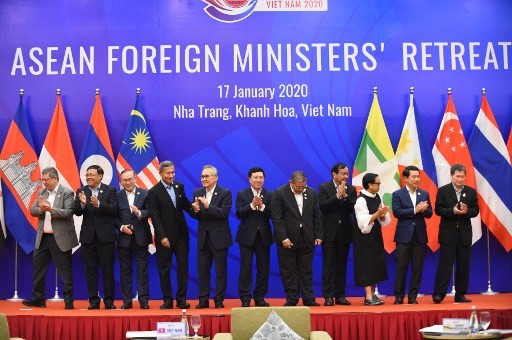ASEAN reaffirms international law as basis for sovereignty in South China Sea
Change Size
 Foreign ministers of ASEAN: Malaysia's Saifuddin Abdullah (left to right), Myanmar's Union Minister for International Cooperation Kyaw Tin, the Philippines' Teodoro Locsin, Singapore's Vivian Balakrishnan, Thailand's Don Pramudwinai, Vietnam's Pham Binh Minh, Brunei's Minister of Foreign Affairs Erywan bin Mohd Yusof, Cambodia's Prak Sokhonn, Indonesia's Retno LP Marsudi, Laos' Saleumxay Kommasith and ASEAN Secretary-General Lim Jock Hoi pose for a group photo during the ASEAN Foreign Ministers' Retreat in Nha Trang on Friday, Jan. 17. (AFP/Nhac Nguyen)
Foreign ministers of ASEAN: Malaysia's Saifuddin Abdullah (left to right), Myanmar's Union Minister for International Cooperation Kyaw Tin, the Philippines' Teodoro Locsin, Singapore's Vivian Balakrishnan, Thailand's Don Pramudwinai, Vietnam's Pham Binh Minh, Brunei's Minister of Foreign Affairs Erywan bin Mohd Yusof, Cambodia's Prak Sokhonn, Indonesia's Retno LP Marsudi, Laos' Saleumxay Kommasith and ASEAN Secretary-General Lim Jock Hoi pose for a group photo during the ASEAN Foreign Ministers' Retreat in Nha Trang on Friday, Jan. 17. (AFP/Nhac Nguyen)
A
SEAN’s top diplomats have reaffirmed the need to respect international law amid concerns over tensions in the South China Sea, where Chinese vessels have repeatedly violated other countries’ sovereign rights.
The regional bloc’s foreign ministers were in the coastal city of Nha Trang in southern Vietnam on Thursday and Friday for a closed-door retreat session, where they candidly discussed national and regional concerns, including the situation in the highly disputed South China Sea.
The meeting marks the first ASEAN meeting under the chairmanship of Vietnam.
Vietnamese Foreign Minister Pham Binh Minh said all ASEAN countries voiced their concerns on land reclamations and serious incidents in the South China Sea.
He called for countries to enhance mutual trust, "exercise self-restraint in the conduct of activities and avoid actions that may further complicate the situation", as well as pursue peaceful resolutions of disputes in accordance with international laws, including the 1982 United Nations Convention on the Law of the Sea (UNCLOS).
“We reaffirmed that international law, including the 1982 UNCLOS, is the basis for determining sovereignty, sovereign rights and legitimate interests over maritime areas. We further reaffirmed that the 1982 UNCLOS is the overarching framework of legal order for the seas that must be respected by all countries,” he said in a statement after the meeting.
The ASEAN ministers did not mention China in their document on Friday, but the statement is an apparent reference to China, whose sweeping claims to the South China Sea were based on the so-called "nine-dash line" and were already invalidated by a 2016 international arbitration ruling favoring the other claimants.
Beijing has rejected the ruling, continuing instead to deploy military assets and exploit resources in the South China Sea.
Most recently, Chinese fishing and coast guard vessels entered Indonesia’s exclusive economic zone (EEZ) in the North Natuna Sea, which resulted in a diplomatic spat, with Indonesia saying it would never recognize China’s nine-dash line, nor would it negotiate with China.
Previously, a number of Chinese vessels were involved in a months-long standoff with Vietnamese authorities near an oil block within Vietnam’s EEZ.
China’s increasingly hostile behavior toward countries around the South China Sea might pose a threat to the early conclusion of a code of conduct (COC) in the South China Sea, a set of provisions negotiated between China and all 10 countries to manage and prevent conflict in the hotly contested waters.
Chinese Premier Li Keqiang said in 2018 that the negotiations would be completed within three years’ time, and it is currently in the second reading phase, where parties begin to get into substantial points. Among the contentious issues are whether the COC will be legally binding and whether it applies only within a limited scope.
According to Pham Binh Minh, all ASEAN foreign ministers were encouraged by the progress of substantive negotiations over the early conclusion of "an effective and substantive COC that is consistent with international law", including the 1982 UNCLOS.
“We emphasized the need to maintain and promote an environment conducive to the COC negotiations, and thus welcomed practical measures that could reduce tensions and the risk of accidents, misunderstandings and miscalculation,” he said.






